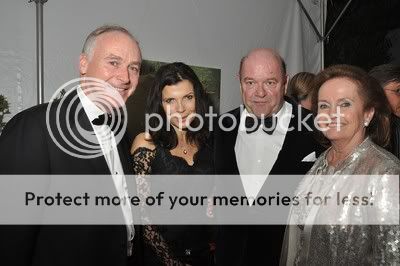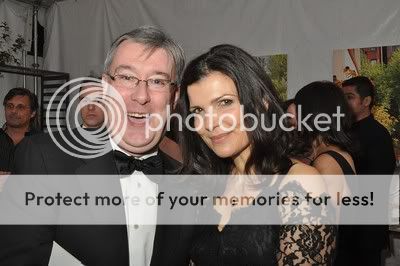Mrs Bono on how fashion can save the world
The U2 star’s wife, Ali Hewson, is determined to shrug off the sackcloth image of ethical fashion. Now she has extra backing
It’s not like doing an interview in Carnaby Street or Hoxton. To reach this particular fashion hot spot, I took two planes — to Amsterdam, then Entebbe — drove north for five hours to the world’s most malarial zone, home to outbreaks of ebola and civil war, and rattled for a further 90 minutes, along deeply pitted roads, till the van could go no further.
Climbing out, I nervously descended a sheer cliff, then hacked through the bush to find... not Mr Kurtz, the elusive genius of Conrad’s Heart of Darkness, but Ali Hewson, sitting in the golden sunlight of the late afternoon beside a stunning waterfall, surrounded by hair and make-up, stylist, photographer and assistant, marketing director, new chief executive and at least a couple of unspecified others from her New York PR firm, one of them armed with machetes.
Oh, and a couple of topless models. Hewson, the glamorous figurehead of the ethical fashion movement, but also a mother of four, asks mildly why the models must be topless, only to be told that the idea came from her husband. Bono, U2’s singer (real name Paul Hewson), is not present, but had given instructions that the pictures be as sexy as possible, to avoid the slightest danger that the ethical clothing produced by their company, Edun, might appear too worthy to wear.
Ethical clothing: this dismal, reproachful term has been kicking around for some time, but since Edun sold a 49% stake to the fashion conglomerate LVMH last May, it has definitively gone mainstream. But what exactly does ethical mean? Organic? Fairtrade? Off-white and itchy? I’m hoping that by following Hewson round in Uganda, I may find out — and discover whether it can really be good business. I’ve been sent because I had the folly to write a book about my own struggles with wholesome clothing — spurred by climate change, recession and general what’s-it-all-about angst — concluding that the best way to avoid exploiting the planet or other people, and to stop worrying and enjoy the moment, was to make my own clothes, preferably using local materials, right down to a pair of Y-fronts that I crocheted out of nettle. It was fun, but I grant that most people won’t do the same, so the clothing industry still has a future.
Hewson, 49, is pretty, with terrific skin, and in good shape thanks to a regime that includes yoga (“but not ashtanga, which did for my knee”). Compared with other rock-star wives you could mention, she’s unassuming and good-natured. She talks enthusiastically about livestock at her home in Dublin — they’re about to install beehives — and the miracle of watching plants grow from seed (which makes her believe there is “a higher intelligence”). And she dips constantly into her handbag to supply all around her with bug spray, oatcakes, pumpkin seeds and dried pineapple. Not for nothing did Bono, who met her at school, write a song about Ali called The Sweetest Thing.
Ever since Live Aid in the 1980s, the Hewsons have been committed to tackling global poverty. In 2005 they decided to set up Edun. By then, Bono had engaged with governments and finance at the highest levels. “But we wanted to see how things function on the ground,” Hewson says, “and put our money where our mouths were.”
Africa should not merely wait for handouts, they felt, but establish a sustainable, self-propelled escape from poverty and assorted trouble through trade. Edun would help to bring that about by providing a reliable market for raw materials such as cotton, as well as encouraging others to trade with Africa. “Few understand that fashion is so powerful,” she says. “It is not superficial, as so many think. It has the ability to change lives and lift millions out of poverty.” In other words, the ethical focus was people, rather than the planet — although, as we’ll see, the two are connected.
The company’s good works have been impressive, and not only in Uganda, which Hewson is visiting for the first time. Until recently, the north of the country was regarded as a no-go zone. For a decade, about 2m people were stuck in displaced person’s camps, chased there by their own government lest they were harbouring rebels in their mud huts. Many had cattle stolen by government troops and children abducted by rebels. After relying on UN handouts for so long, many more became lazy. Others were psychologically shattered by conflict. A small minority kept the farming spirit alive by sneaking off to walk mile after mile under the equatorial sun to cultivate hanky-sized corners of their neglected land for food. These impressive individuals have been selected by Edun as “lead farmers” in each village.
After the fashion shoot, Hewson’s sizeable entourage travelled to one village to meet the farmers who supplied a decent cotton crop last year. Everyone present made a speech, even me. It was desperately moving — I don’t mean my speech — but I worried that our visit may have given false hopes. The sheer novelty of seeing so many white people in their village, where none had been before, struck them as terrifically auspicious.
As well as helping farmers to grow cotton, Edun wants to buy them engines to process their own harvest, separating the cotton lint from the seeds, which are a valuable source of edible oil and cattle feed. We also visited a school where Edun is working with a local NGO to provide scholarships and fund structural improvements. Another project it is investigating is how to provide nets to save lives in a part of Africa where people are bitten, on average, 1,571 times a year by malarial mosquitos.
Has Edun ever set a limit to the scope of its good works? “No, there was no limit,” Hewson says, with a mildly sheepish expression that acknowledges this mission creep might have been unbusinesslike. Alas, they failed to put similar efforts into the fashion end. Though given slack by an industry eager to see it do well, by common consent Edun’s designs left a lot to be desired.
The Hewsons were effectively pouring money into helping Africa, but their chosen vehicle — a fashion label — obstinately refused to establish itself as a business, until a fortuitous meeting a couple of years ago. Ali and Bono were having lunch with friends and discovered, among the other guests, Bernard Arnault, chairman and CEO of the fashion conglomerate LVMH. Bono asked his advice — and now Edun is part of the LVMH stable of luxury brands, standing alongside Céline, Louis Vuitton and Dior. Arnault acknowledged Edun as a pioneer, and said that LVMH shared its “vision and ethical values”, and was committed to advancing them further.
One of Arnault’s first moves was to install a tough new CEO, Janice Sullivan, who has worked for DKNY and, most recently, CK Jeans. A ballsy American, very much focused on fashion, she has come to Uganda with Hewson to ask the difficult questions. In a cotton field, she wants to know how much smaller the yield is when you farm organically; later, she asks what kind of premium is payable for organic cotton. The answers, although hedged with qualification, allow her to conclude that organic can conceivably turn a profit.
Are the Hewsons happy to have given up so much control to a conglomerate that has not, hitherto, been particularly well known for its ethical stance? They are, Hewson says, because they spent two years negotiating a contract that enshrines everything they stand for in the company’s constitution: specifically, respect for the people who make the clothes, the communities they live in, the materials they use and, ultimately, the consumer.
All that remains is to get the design right. In January, Edun appointed a new creative director, the Paris-based, Irish-born designer Sharon Wauchob, to give a cool coherence to the clothes.
The day before we leave, over breakfast of powdered coffee and plastic toast at the best hotel in town — little better than a run-down British youth hostel — I ask Hewson if she shouldn’t be helping her neighbours closer to home.
Forget Ugandan cotton, what about Irish linen? That, too, had a strong tradition once. Why not set up a factory in Ireland? She thinks carefully before replying: “We live in Ireland, and it’s given us a great life. It’s tough in Ireland, but it’s much tougher here.”
Then the tough cookie from LVMH cuts in. “Her job is not to open factories,” Sullivan tells me firmly. “I want Edun to be a big brand, extraordinarily successful.” She stops, smiles, carries on. “The more successful we are, the more people we can help.”

















 she is. She is very beautiful woman
she is. She is very beautiful woman 








